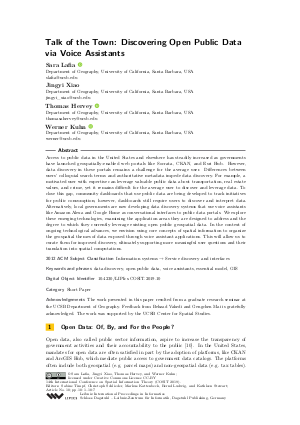Talk of the Town: Discovering Open Public Data via Voice Assistants (Short Paper)
Authors
Sara Lafia  ,
Jingyi Xiao,
Thomas Hervey
,
Jingyi Xiao,
Thomas Hervey  ,
Werner Kuhn
,
Werner Kuhn 
-
Part of:
Volume:
14th International Conference on Spatial Information Theory (COSIT 2019)
Part of: Series: Leibniz International Proceedings in Informatics (LIPIcs)
Part of: Conference: Conference on Spatial Information Theory (COSIT) - License:
 Creative Commons Attribution 3.0 Unported license
Creative Commons Attribution 3.0 Unported license
- Publication Date: 2019-09-03
File

PDF
LIPIcs.COSIT.2019.10.pdf
- Filesize: 1.02 MB
- 7 pages
Document Identifiers
Subject Classification
ACM Subject Classification
- Information systems → Service discovery and interfaces
Keywords
- data discovery
- open public data
- voice assistants
- essential model
- GIS
Metrics
- Access Statistics
-
Total Accesses (updated on a weekly basis)
0PDF Downloads0Metadata Views
Abstract
Access to public data in the United States and elsewhere has steadily increased as governments have launched geospatially-enabled web portals like Socrata, CKAN, and Esri Hub. However, data discovery in these portals remains a challenge for the average user. Differences between users' colloquial search terms and authoritative metadata impede data discovery. For example, a motivated user with expertise can leverage valuable public data about transportation, real estate values, and crime, yet it remains difficult for the average user to discover and leverage data. To close this gap, community dashboards that use public data are being developed to track initiatives for public consumption; however, dashboards still require users to discover and interpret data. Alternatively, local governments are now developing data discovery systems that use voice assistants like Amazon Alexa and Google Home as conversational interfaces to public data portals. We explore these emerging technologies, examining the application areas they are designed to address and the degree to which they currently leverage existing open public geospatial data. In the context of ongoing technological advances, we envision using core concepts of spatial information to organize the geospatial themes of data exposed through voice assistant applications. This will allow us to curate them for improved discovery, ultimately supporting more meaningful user questions and their translation into spatial computations.
Cite As Get BibTex
Sara Lafia, Jingyi Xiao, Thomas Hervey, and Werner Kuhn. Talk of the Town: Discovering Open Public Data via Voice Assistants (Short Paper). In 14th International Conference on Spatial Information Theory (COSIT 2019). Leibniz International Proceedings in Informatics (LIPIcs), Volume 142, pp. 10:1-10:7, Schloss Dagstuhl – Leibniz-Zentrum für Informatik (2019)
https://doi.org/10.4230/LIPIcs.COSIT.2019.10
BibTex
@InProceedings{lafia_et_al:LIPIcs.COSIT.2019.10,
author = {Lafia, Sara and Xiao, Jingyi and Hervey, Thomas and Kuhn, Werner},
title = {{Talk of the Town: Discovering Open Public Data via Voice Assistants}},
booktitle = {14th International Conference on Spatial Information Theory (COSIT 2019)},
pages = {10:1--10:7},
series = {Leibniz International Proceedings in Informatics (LIPIcs)},
ISBN = {978-3-95977-115-3},
ISSN = {1868-8969},
year = {2019},
volume = {142},
editor = {Timpf, Sabine and Schlieder, Christoph and Kattenbeck, Markus and Ludwig, Bernd and Stewart, Kathleen},
publisher = {Schloss Dagstuhl -- Leibniz-Zentrum f{\"u}r Informatik},
address = {Dagstuhl, Germany},
URL = {https://drops.dagstuhl.de/entities/document/10.4230/LIPIcs.COSIT.2019.10},
URN = {urn:nbn:de:0030-drops-111026},
doi = {10.4230/LIPIcs.COSIT.2019.10},
annote = {Keywords: data discovery, open public data, voice assistants, essential model, GIS}
}
Author Details
Acknowledgements
The work presented in this paper resulted from a graduate research seminar at the UCSB Department of Geography. Feedback from Behzad Vahedi and Gengchen Mai is gratefully acknowledged. The work was supported by the UCSB Center for Spatial Studies.
References
- Guoray Cai, Hongmei Wang, Alan M. MacEachren, and Sven Fuhrmann. Natural Conversational Interfaces to Geospatial Databases. Transactions in GIS, 9(2):199-221, March 2005. URL: https://doi.org/10.1111/j.1467-9671.2005.00213.x.
- Wendy Carrara, Wae San Chan, Sander Fischer, and Evan Steenbergen. Creating value through open data: Study on the impact of re-use of public data resources. European Commission, 2015. URL: https://doi.org/10.2759/328101.
- Davide Castelvecchi. Google unveils search engine for open data. Nature, 561(7722):161-162, 2018. URL: https://doi.org/10.1038/d41586-018-06201-x.
-
John Daniels and Steve Cook. Designing Object Systems: Object-oriented Modelling with Syntropy. Prentice Hall, Englewood Cliffs, NJ, September, 1994. ISBN: 0-13-203860-9.

- George W. Furnas, Thomas K. Landauer, Louis M. Gomez, and Susan T. Dumais. The vocabulary problem in human-system communication. Communications of the ACM, 30(11):964-971, 1987. URL: https://doi.org/10.1145/32206.32212.
- Peter A. Johnson, Renee Sieber, Teresa Scassa, Monica Stephens, and Pamela Robinson. The Cost(s) of Geospatial Open Data. Transactions in GIS, 21(3):434-445, 2017. URL: https://doi.org/10.1111/tgis.12283.
- Werner Kuhn. Core concepts of spatial information for transdisciplinary research. International Journal of Geographical Information Science, 26(12):2267-2276, 2012. URL: https://doi.org/10.1080/13658816.2012.722637.
- Sara Lafia, Andrew Turner, and Werner Kuhn. Improving Discovery of Open Civic Data. LIPIcs-Leibniz International Proceedings in Informatics, 114(9):1-15, 2018. URL: https://doi.org/10.4230/LIPIcs.GIScience.2018.9.
- Behzad Vahedi, Werner Kuhn, and Andrea Ballatore. Question-based spatial computing—A case study. In Geospatial Data in a Changing World, pages 37-50. Springer, 2016. URL: https://doi.org/10.1007/978-3-319-33783-8_3.
- Anneke Zuiderwijk and Marijn Janssen. Open data policies, their implementation and impact: A framework for comparison. Government Information Quarterly, 31(1):17-29, 2014. URL: https://doi.org/10.1016/j.giq.2013.04.003.
